Network technicians are the backbone of any organization's IT infrastructure. They ensure that all network systems function smoothly and efficiently, maintaining connectivity and security across various platforms.
The role requires a solid understanding of network hardware and software, including routers, switches, firewalls, and VPNs. Skills such as problem-solving, attention to detail, and effective communication are also important for success in this field.
Candidates can write these abilities in their resumes, but you can’t verify them without on-the-job Network Technician skill tests.
In this post, we will explore 7 essential Network Technician skills, 6 secondary skills and how to assess them so you can make informed hiring decisions.
Table of contents
7 fundamental Network Technician skills and traits
The best skills for Network Technicians include Network Configuration, Troubleshooting, Security Management, Hardware Installation, Performance Monitoring, Protocol Analysis and Documentation.
Let’s dive into the details by examining the 7 essential skills of a Network Technician.
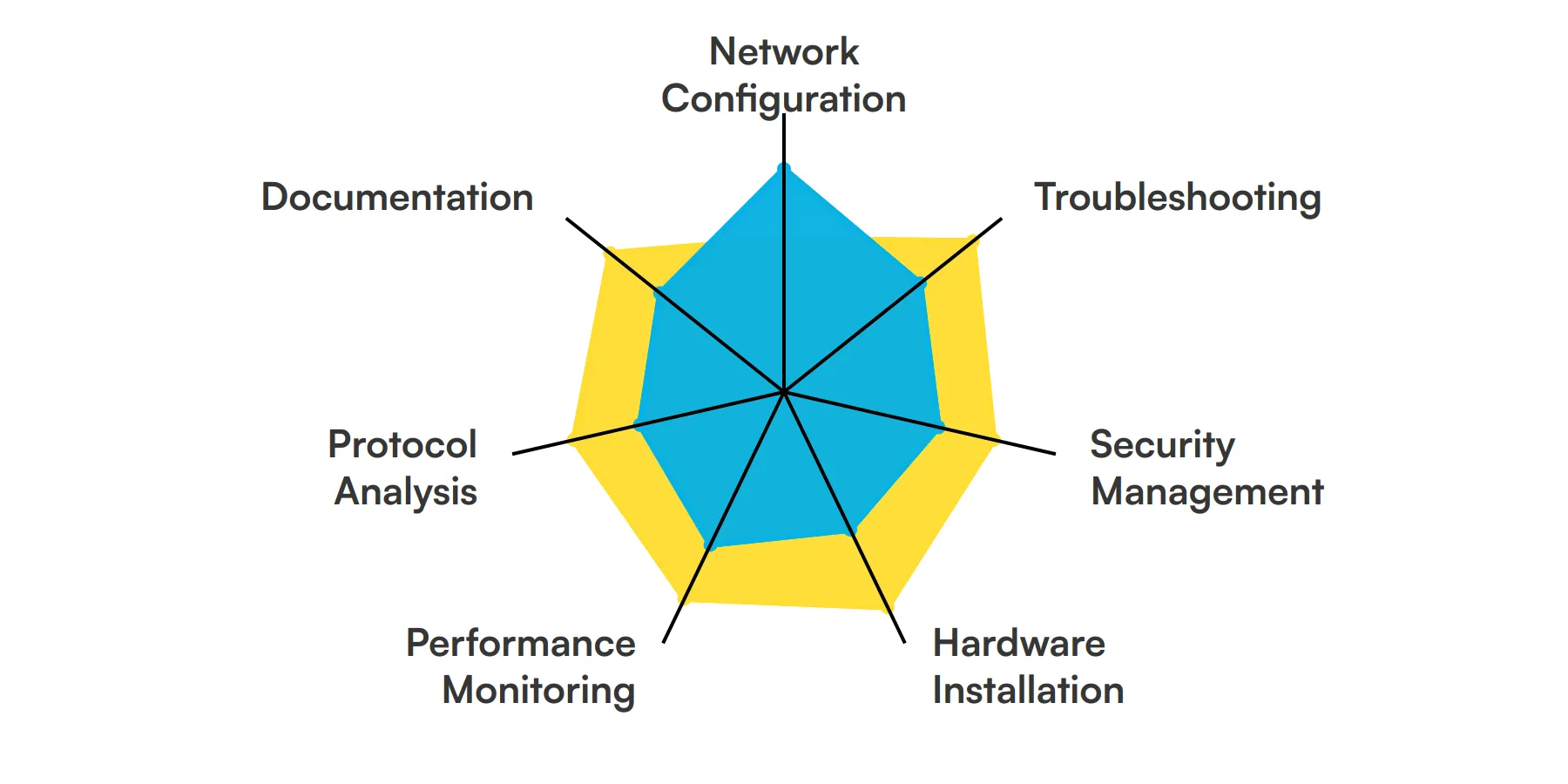
Network Configuration
Network technicians must master network configuration, which involves setting up and configuring network hardware and software. This skill ensures that all components communicate effectively, maintaining system integrity and supporting the flow of data across the network.
For more insights, check out our guide to writing a Network Technician Job Description.
Troubleshooting
Troubleshooting is a critical skill for network technicians as it involves identifying, diagnosing, and resolving network issues. This skill helps minimize downtime and ensures reliable network performance, which is crucial for any organization's operations.
Security Management
Understanding and implementing network security protocols is essential for a network technician. This skill protects the network from unauthorized access and cyber threats, ensuring the confidentiality, integrity, and availability of data.
Check out our guide for a comprehensive list of interview questions.
Hardware Installation
Network technicians are responsible for the physical setup of network devices such as routers, switches, and hubs. Proper installation is key to preventing hardware failures and ensuring optimal network performance.
Performance Monitoring
Regular monitoring of network performance helps network technicians preempt issues and optimize data flow. This skill involves using specialized software tools to track performance metrics and identify areas for improvement.
Protocol Analysis
Protocol analysis is crucial for understanding and managing the various communication protocols within a network. Network technicians use this skill to ensure that all parts of the network are correctly speaking the same digital 'language'.
Documentation
Accurate documentation is necessary for maintaining records of the network setup and any changes made. This skill helps in troubleshooting future problems and is useful during system upgrades or audits.
For more insights, check out our guide to writing a Technical Writer Job Description.
6 secondary Network Technician skills and traits
The best skills for Network Technicians include Vendor Management, Customer Service, Software Updates, Backup Management, Capacity Planning and Training.
Let’s dive into the details by examining the 6 secondary skills of a Network Technician.
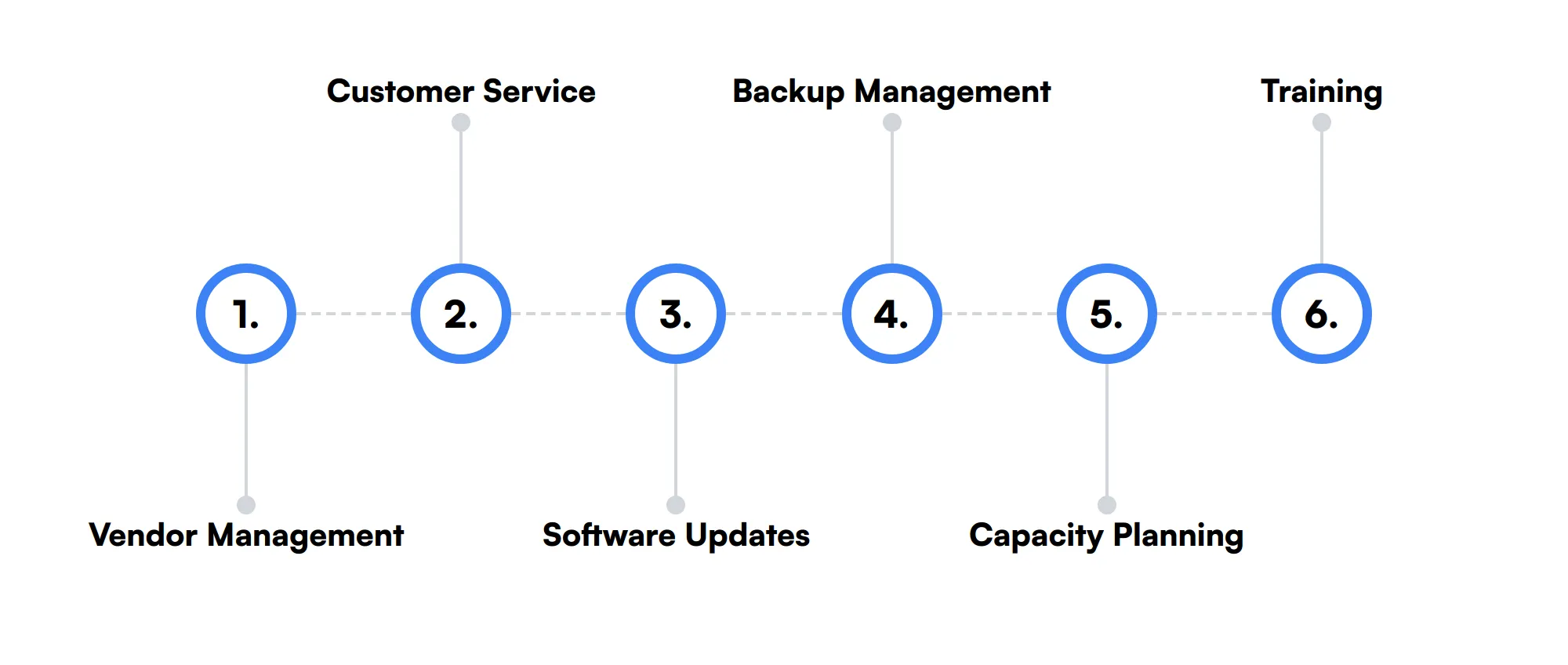
Vendor Management
Dealing with third-party vendors for services and equipment is a common task for network technicians. Effective vendor management ensures timely procurement and quality service.
Customer Service
Network technicians often interact with clients or internal users to resolve network issues. Good customer service skills are important to communicate effectively and ensure user satisfaction.
Software Updates
Keeping network software up-to-date is crucial for security and performance. Network technicians manage software patches and updates to mitigate vulnerabilities and enhance functionality.
Backup Management
Regular backups are essential to prevent data loss in case of hardware failure or cyber attacks. Network technicians manage backup protocols and recovery processes.
Capacity Planning
Understanding and planning for future network capacity needs is important for scalability. This skill involves analyzing current usage trends to predict future demands.
Training
Network technicians may be required to train other staff on basic network management and security practices. This helps in reducing human error and spreading best practices across the organization.
How to assess Network Technician skills and traits
Assessing the skills and traits of a Network Technician involves more than just glancing at their resume. While certifications and past job experiences are informative, they don't fully reveal a candidate's hands-on capabilities in network configuration, troubleshooting, or security management.
To truly understand whether a candidate will excel in a real-world environment, you need a method that tests these skills directly. This is where practical assessments come into play. By using skill assessments, you can directly test a candidate's ability to handle network setups, diagnose issues, and manage network security effectively.
Adaface assessments offer a tailored approach to evaluating the core competencies of Network Technicians. With tests designed to measure expertise in areas like hardware installation, performance monitoring, and protocol analysis, you can ensure that your candidates are not just qualified, but are the best fit for the role. Using these assessments can lead to a 2x improvement in the quality of your hires and significantly streamline your screening process.
Let’s look at how to assess Network Technician skills with these 5 talent assessments.
CISCO Routing Switching Test
Our CISCO Routing Switching Test evaluates candidates on their expertise in configuring and troubleshooting Cisco network devices, focusing on routing and switching technologies.
The test assesses knowledge in areas such as Cisco Router and Switch Configuration, Routing Protocols like OSPF and BGP, and Switching Technologies including VLANs and STP.
Candidates proficient in this test demonstrate strong capabilities in network management and troubleshooting Cisco devices using CLI and SNMP.
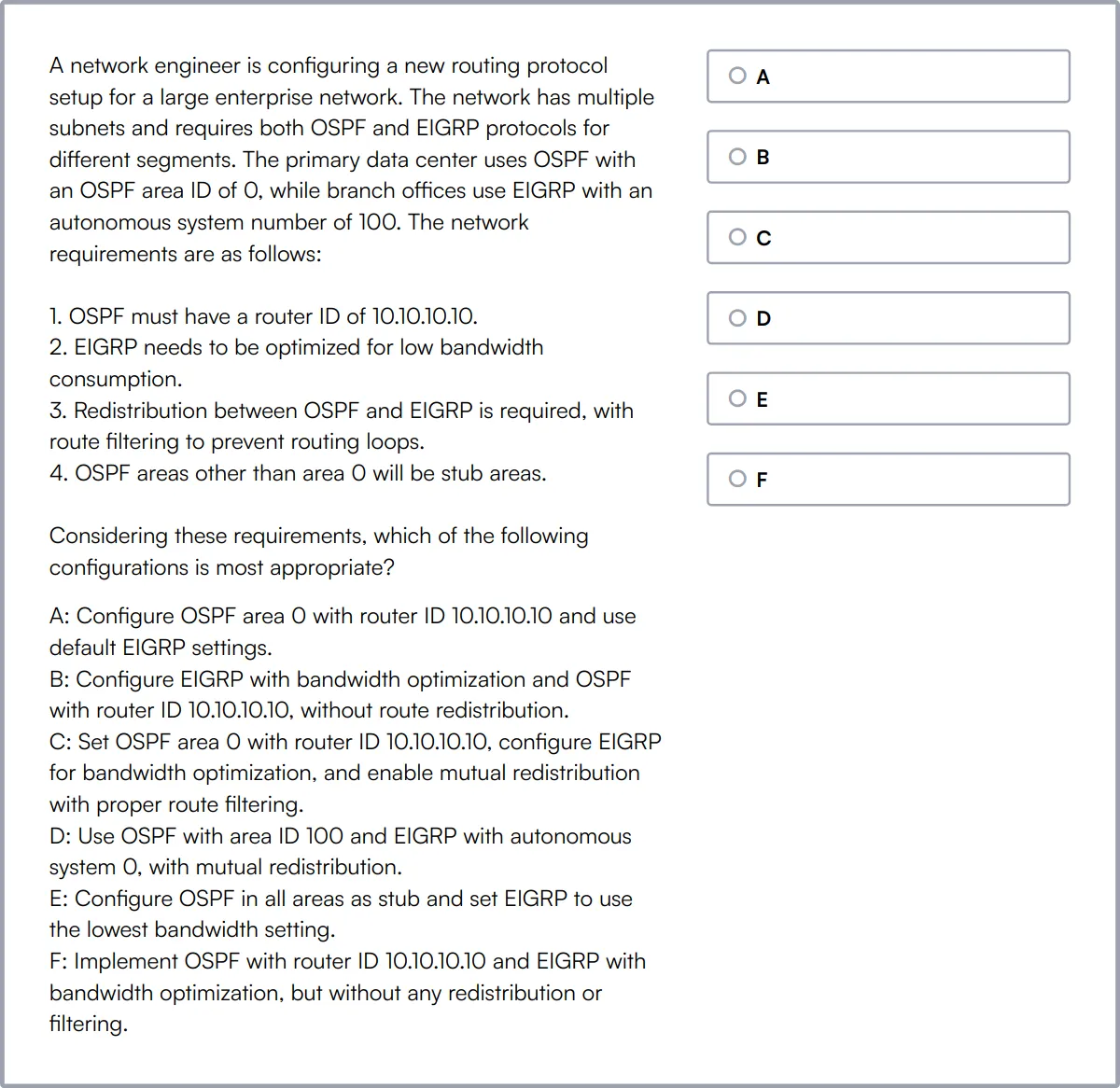
Technical Support Test
Our Technical Support Test measures a candidate's ability to handle real-world IT support scenarios, covering a broad range of technical and communication skills.
This test covers Operating System Fundamentals, Networking Concepts, IT Service Protocols, and customer service skills, including incident reporting and problem-solving.
High-scoring individuals excel in both technical troubleshooting and delivering exceptional customer service, ensuring effective support in IT environments.
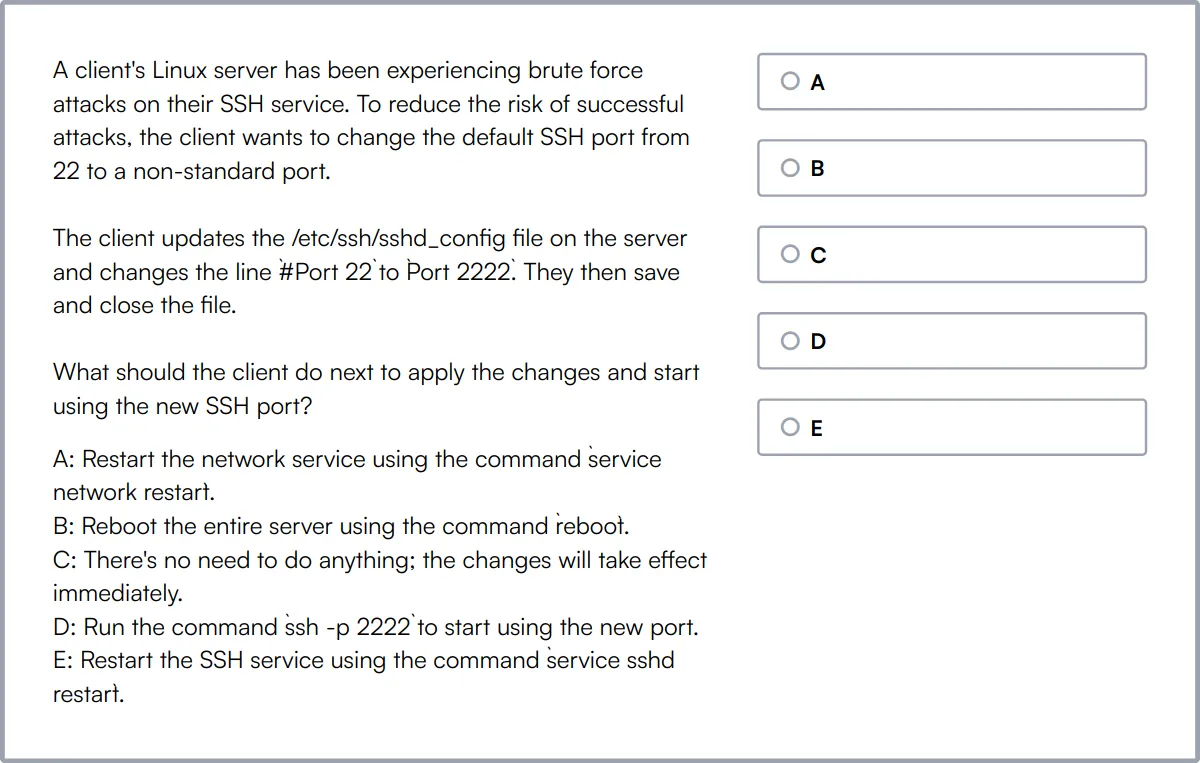
CISCO Security Online Test
Our CISCO Security Online Test focuses on evaluating candidates' understanding of network security using Cisco's security solutions and products.
The assessment includes topics on Cisco Firewall, VPN, and IPS/IDS technologies, along with general network security concepts and best practices.
Successful candidates will demonstrate a thorough understanding of designing and implementing secure network architectures using Cisco security technologies.
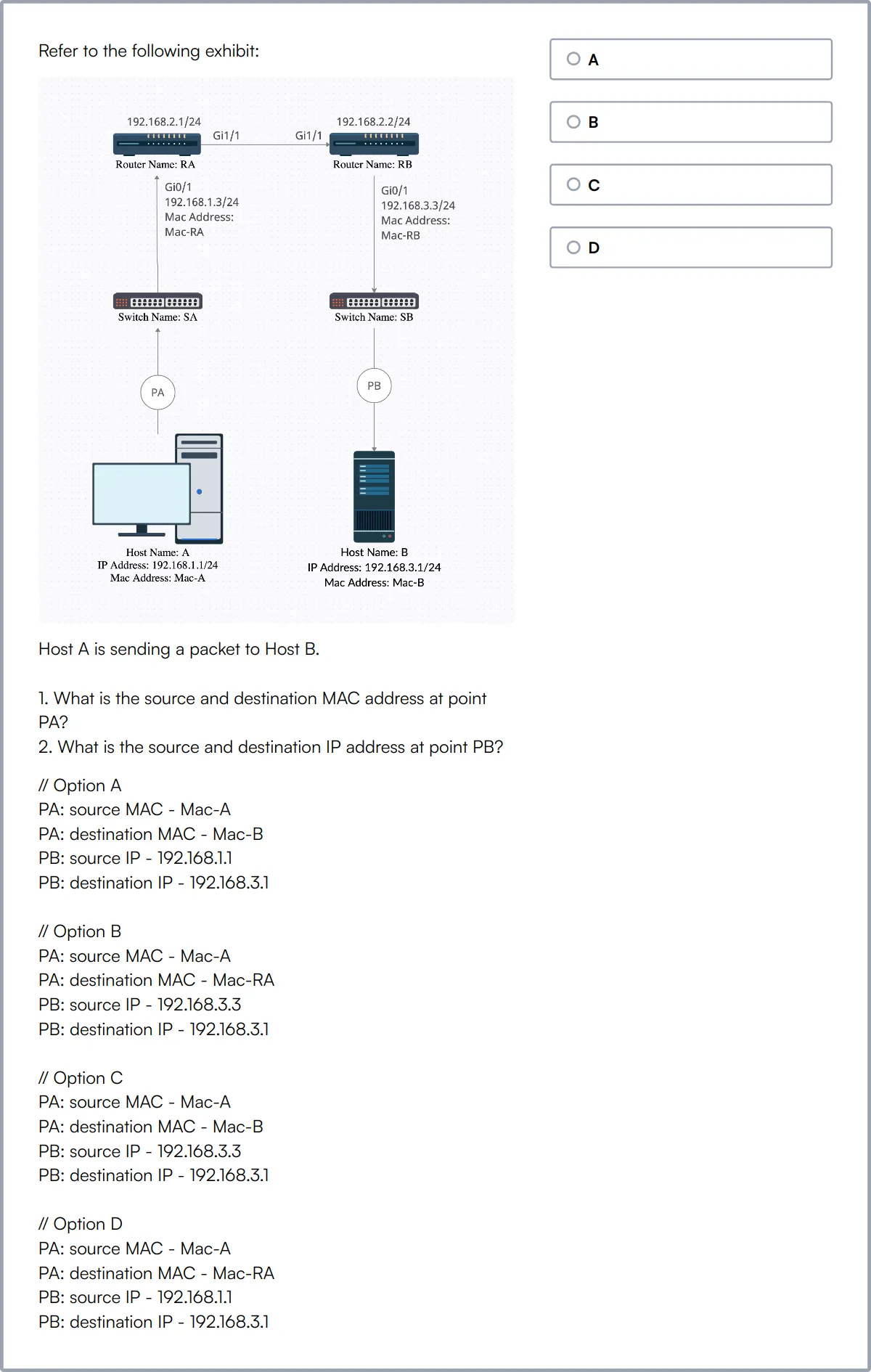
Windows System Administration Online Test
Our Windows System Administration Online Test assesses candidates on their proficiency in managing Windows-based environments, focusing on Active Directory and Group Policy.
Key areas tested include Windows Server management, Active Directory configuration, and PowerShell scripting for automation and system tasks.
Candidates who perform well are adept at ensuring smooth operations and security within Windows server environments.
Network Engineer Online Test
Our Network Engineer Test is designed to evaluate the technical knowledge required for designing, implementing, and managing network infrastructures.
The test covers a wide range of networking topics, including Network Protocols, Security, Routing and Switching, and Network Troubleshooting.
Proficient candidates are capable of optimizing network performance and ensuring secure and efficient data transfer across the network.
Summary: The 7 key Network Technician skills and how to test for them
| Network Technician skill | How to assess them |
|---|---|
| 1. Network Configuration | Evaluate the ability to set up and manage network devices. |
| 2. Troubleshooting | Assess problem-solving skills in identifying and fixing network issues. |
| 3. Security Management | Check proficiency in implementing and maintaining network security measures. |
| 4. Hardware Installation | Gauge skills in installing and configuring network hardware components. |
| 5. Performance Monitoring | Determine capability in monitoring and optimizing network performance. |
| 6. Protocol Analysis | Evaluate understanding of network protocols and their analysis. |
| 7. Documentation | Assess the ability to create clear and comprehensive network documentation. |
Software Support Specialist Test
Network Technician skills FAQs
What skills are essential for a Network Technician?
Key skills include network configuration, troubleshooting, security management, hardware installation, and performance monitoring.
How can recruiters assess a candidate's network configuration skills?
Recruiters can use practical tests or ask candidates to describe past experiences configuring networks, including specific tools and protocols used.
What methods can be used to evaluate troubleshooting abilities?
Scenario-based questions and hands-on problem-solving tasks can help assess a candidate's troubleshooting skills.
Why is security management important for Network Technicians?
Security management ensures the protection of network data and resources from unauthorized access and cyber threats.
How do you test a candidate's hardware installation skills?
Practical assessments where candidates install and configure network hardware can effectively gauge their skills.
What is the role of performance monitoring in network management?
Performance monitoring helps identify and resolve network issues, ensuring optimal performance and uptime.
How can protocol analysis skills be assessed?
Ask candidates to explain how they use protocol analyzers like Wireshark to diagnose network issues.
What is the importance of documentation in network management?
Documentation provides a record of network configurations, changes, and procedures, aiding in troubleshooting and future upgrades.
Assess and hire the best Network Technicians with Adaface
Assessing and finding the best Network Technician is quick and easy when you use talent assessments. You can check out our product tour, sign up for our free plan to see talent assessments in action or view the demo here:

40 min skill tests.
No trick questions.
Accurate shortlisting.
We make it easy for you to find the best candidates in your pipeline with a 40 min skills test.
Try for freeRelated posts
Free resources



